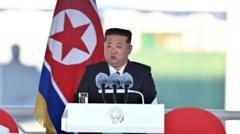The surge in Chinese police operations against the Boys' Love genre—a realm of online romance fiction focusing on male relationships—has reached alarming heights. Reports indicate that authorities have detained a significant number of writers, many of whom are young women, who have been self-publishing gay erotic novels online. These actions mark what is believed to be the most extensive police crackdown on this literary movement in the country to date.
One notable case involved a graduate student who wrote a romance spanning 75 chapters centering on a romantic relationship between two male characters. Despite generating less than $400 in revenue, her work now jeopardizes her future, as it has come under scrutiny from the police. The crackdown has reportedly involved multiple cases, with at least 12 authors previously tried for obscenity in Anhui Province, and investigations have expanded to Gansu Province.
Originating from Japan and gaining traction since the 1990s, Boys' Love has captivated a dedicated audience in China, especially among heterosexual women seeking narratives that defy traditional gender roles in love stories. The genre saw a peak in popularity during the 2010s, birthing numerous hit television adaptations and propelling the careers of prominent male actors.
However, as Boys' Love's audience grew, so did governmental outrage. State media has labeled such narratives as "vulgar," asserting that LGBTQ storylines could negatively influence young readers' sexual perceptions. The backlash has led to numerous adaptations being canceled and an outright ban on gay-themed broadcasts.
This recent crackdown sheds light on the precarious existence of creative expression in an increasingly conservative landscape, where artistic freedom clashes with state-imposed moral standards. The implications for those working in the genre are severe, with heavy fines and lengthy prison sentences lurking for authors unabashedly expressing their narratives. The chilling winds of censorship continue to sweep across China's vibrant literary scene, posing a dire threat to those who dare to write outside prescribed boundaries.
One notable case involved a graduate student who wrote a romance spanning 75 chapters centering on a romantic relationship between two male characters. Despite generating less than $400 in revenue, her work now jeopardizes her future, as it has come under scrutiny from the police. The crackdown has reportedly involved multiple cases, with at least 12 authors previously tried for obscenity in Anhui Province, and investigations have expanded to Gansu Province.
Originating from Japan and gaining traction since the 1990s, Boys' Love has captivated a dedicated audience in China, especially among heterosexual women seeking narratives that defy traditional gender roles in love stories. The genre saw a peak in popularity during the 2010s, birthing numerous hit television adaptations and propelling the careers of prominent male actors.
However, as Boys' Love's audience grew, so did governmental outrage. State media has labeled such narratives as "vulgar," asserting that LGBTQ storylines could negatively influence young readers' sexual perceptions. The backlash has led to numerous adaptations being canceled and an outright ban on gay-themed broadcasts.
This recent crackdown sheds light on the precarious existence of creative expression in an increasingly conservative landscape, where artistic freedom clashes with state-imposed moral standards. The implications for those working in the genre are severe, with heavy fines and lengthy prison sentences lurking for authors unabashedly expressing their narratives. The chilling winds of censorship continue to sweep across China's vibrant literary scene, posing a dire threat to those who dare to write outside prescribed boundaries.




















